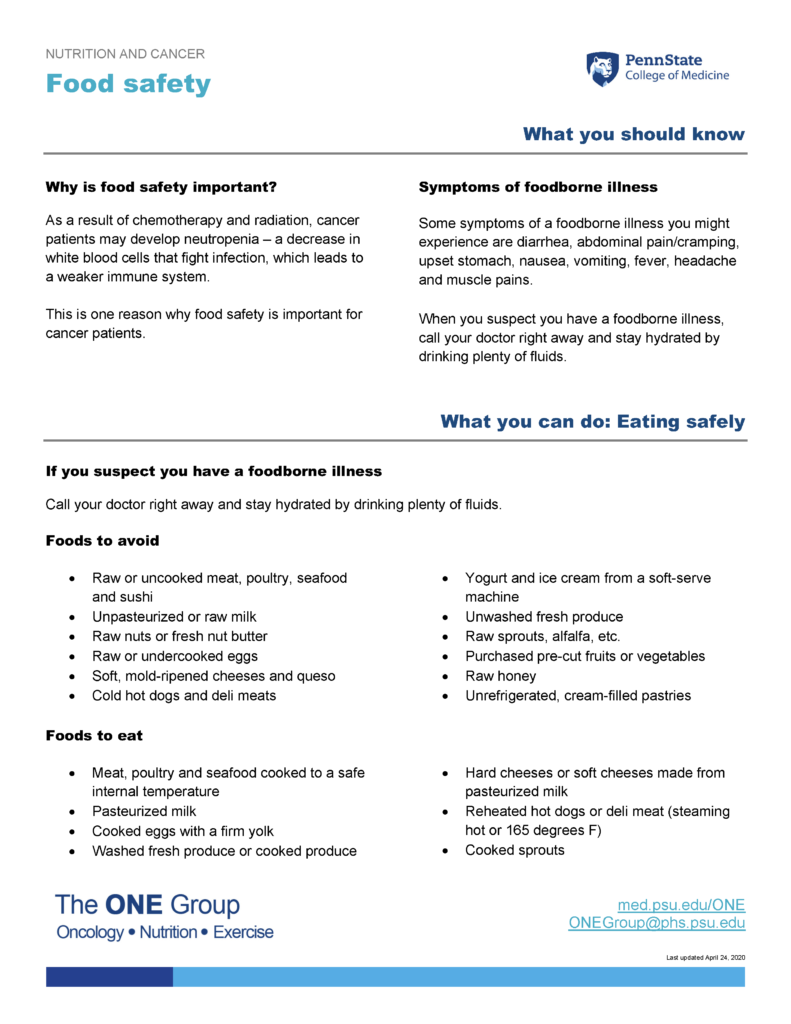Learn about food safety for people with cancer in this guide from The ONE Group (Oncology – Nutrition – Exercise) at Penn State College of Medicine.
Jump to topic
Search
What you should know
Why is food safety important?
As a result of chemotherapy and radiation, cancer patients may develop neutropenia – a decrease in white blood cells that fight infection, which leads to a weaker immune system.
This is one reason why food safety is important for cancer patients.
Symptoms of foodborne illness
Some symptoms of a foodborne illness you might experience are diarrhea, abdominal pain/cramping, upset stomach, nausea, vomiting, fever, headache and muscle pains.
When you suspect you have a foodborne illness, call your doctor right away and stay hydrated by drinking plenty of fluids.
What you can do: Eating safely
If you suspect you have a foodborne illness
Call your doctor right away and stay hydrated by drinking plenty of fluids.
Foods to avoid
- Raw or uncooked meat, poultry, seafood and sushi
- Unpasteurized or raw milk
- Raw nuts or fresh nut butter
- Raw or undercooked eggs
- Soft, mold-ripened cheeses and queso
- Cold hot dogs and deli meats
- Yogurt and ice cream from a soft-serve machine
- Unwashed fresh produce
- Raw sprouts, alfalfa, etc.
- Purchased pre-cut fruits or vegetables
- Raw honey
- Unrefrigerated, cream-filled pastries
Foods to eat
- Meat, poultry and seafood cooked to a safe internal temperature
- Pasteurized milk
- Cooked eggs with a firm yolk
- Washed fresh produce or cooked produce
- Hard cheeses or soft cheeses made from pasteurized milk
- Reheated hot dogs or deli meat (steaming hot or 165 degrees F)
- Cooked sprouts
Food safety tips
- Wash your hands and surfaces often. Wash your hands with warm water and soap for 20 seconds before and after preparing food.
- Keep raw meat and poultry separate from ready-to-eat foods.
- Don’t reuse the same rag. Rags can hold bacteria; instead, wipe the kitchen surface with disinfectant wipes.
- Don’t cross-contaminate. Make sure to store raw meats away from cooked food.
- Refrigerate food right away to reduce bacterial growth. To prevent a foodborne illness, make sure your refrigerator is set at 40 degrees F or below.
- Chill perishable foods within two hours.
- Look at the expiration date. If an item is expired, throw it out.
- Cook foods to a safe internal temperature (See below.).
Safe minimum internal temperatures
Following are the safe minimal internal temperatures for cooking meat and poultry:
- 145 degrees F – Beef, pork, lamb and veal (with a three-minute rest time)
- 160 degrees F – Ground meat
- 165 degrees F – All poultry
Questions to ask your doctor
- Am I at increased risk for foodborne illness? How long will this risk last?
- What steps should I take to prevent foodborne illness?
- Which foods require special preparation to prevent foodborne illness?
- What treatment do you recommend for my foodborne illness?
- How can I prevent dehydration?
- Is there anything else I should be asking?
Notes
References
- Cancer.net from ASCO
- Cancer Nutrition Consortium
- Minnesota Oncology
- Stanford Health Care

